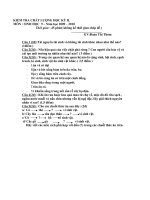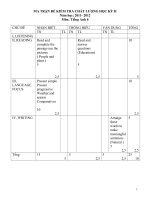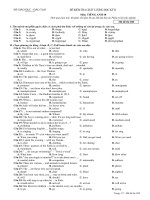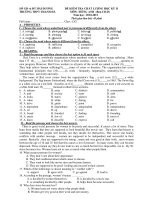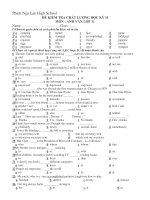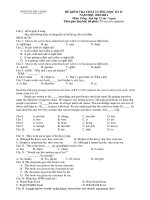Đề kiểm tra chất lượng học kỳ II
Bạn đang xem bản rút gọn của tài liệu. Xem và tải ngay bản đầy đủ của tài liệu tại đây (146.52 KB, 2 trang )
SỞ GD&ĐT HẢI DƯƠNG
TRƯỜNG THPT ĐOÀN THƯỢNG
®Ò kiÓm tra chÊt lîng häc kú I
M«n: TiÕng Anh – Khèi 10
Thêi gian lµm bµi:
I. Reading comprehension (2.5 p)
Read the following passage and answer the questions that follow
Clarence “Ducky“ Nash
In 1933 an unknown American called Clarence Nash went to see the film maker Walt Disney. He
had an unusual voice and he wanted to work in Disney’s cartoon films for children. When Walt Disney
heard Nash’s voice, he said “Stop! That’s our duck!”
The duck was the now famous Donald Duck, who first appeared in 1934 in the film The Wise Little
Hen. Later that year, he became a famous star after an eight minute Mickey Mouse film. The cinema
audiences liked him because he was lazy and greedy, and because he lost his temper very quickly. And
they loved his voice when he became angry with Mickey’s eight nephews. Soon, Donald was more
popular than Mickey Mouse himself.
In the 1930s, ‘40s and ‘50s Donald and his friend Mickey, Goofy and Pluto (the very famous
characters in Disney cartoons) made hundreds of Disney cartoons. He also made educational films about
the place of the USA in the world. Then in 1966 Donald Duck and his voice disappeared – there were no
more new cartoon.
Clarence Nash died in February, 1985. But today’s children can still see the old cartoons on
television and hear that famous voice.
1. Who made Donald Duck film?
2. When was the first Donald Duck film?
3. Why did the cinema audiences like Donald Duck?
4. Name 4 characters in Disney Cartoons
5. Where do today’s children see Donald Duck films?
II. Grammar and vocabulary
Part 1: Write the correct forms of the verbs in brackets. (2 p)
1. The house is dirty because we (not clean) it for a week.
2. She is used to (sleep) late on weekends.
3. She knows exactly the way to her friend’s house. She (come) there twice.
4. Do you mind (travel) such a long way to work everyday?
5. My friends and I often (go) fishing on Sundays.
6. The next Tuesday (be) New Year’s Day. What are you doing then?
Page 1 of 2
§Ò ch½n
7. Where’s Mary? She (be) here just some minutes ago.
8. They (not ever be) to that town before they met her friend.
9. The young (not like) staying at home for hours without talking to their friends.
10. Someone must have taken my handbag. I clearly remember (leave) it by the window.
Part 2: Complete each of the following sentences without changing the original meaning (3 p)
11. The girl is crying. She is my friend’s sister.
The girl who ………………………………………………………………………………
12. They haven’t watered the plants for a week.
The plants ………………………………………………………………………………..
13. Although he took a taxi, he still came to work late.
In spite of ………………………………………………………………………………..
14. She didn’t pass the exam because she was lazy.
Because of ………………………………………………………………………………
15. Mary wants to know when Jack went to her house yesterday.
“When ……………………………………….yesterday, Mum?” Mary asks her mother.
III. Writing (2.5 p)
You want to apply to go on a holiday study. Fill in the form below:
___The end___
INTERNATIONAL STUDY HOLIDAYS
Westhay University
Luxford LX 92 1AR
July 26
th
to August 15
th
Family name: (IN CAPITAL LETTER) (1)………………………………………………………………………
First name: (IN CAPITAL LETTER) (2)…………………………………………………………………………
Present address: (3)……………………………………………………………………………………………………
Date of birth (month/ day/ year): (4)……………………………………………………………………
Nationality: (IN CAPITAL LETTER) (5) ………………………………………………………………………..
Occupation: (IN CAPITAL LETTER) (6) ………………………………………………………………………..
Why are you applying for a holiday study?
(7) ……………………………………………………………………………………………………………………………………
What languages can you speak?
(8) …………………………………………………………………………………………….........................................
How will you be traveling?
(9) ……………………………………………………………………………………………………………………………………
Signature: (10) ………………………………………………………………………………..
Page 2 of 2

